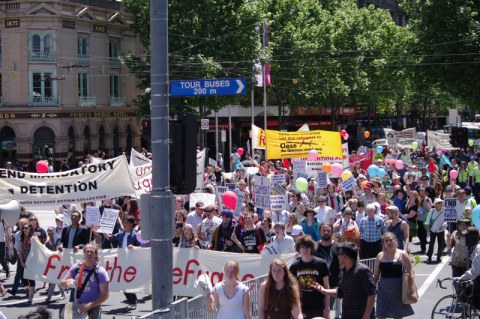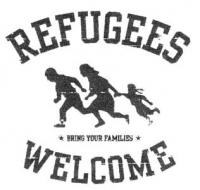The Refugee Action Collective (Victoria)organised a rally and march reiterating demands for an end to mandatory detention and offshore processing. This came in the wake of two events: the High Court decision ruling the government’s intended Malaysia deal illegal, and the drowning deaths of asylum seekers off the coast of Java a few days previously.
Among the speakers at the State Library were Mahendra Kusumawardan, refugee activist from Indonesia, and Aran Mylvaganam, a refugee from Sri Lanka. Others included Sister Brigid Arthur of the Brigidine Asylum Seekers’ Project, Kate Jeffery of Labor for Refugees, Louise Newman of the Alliance of Health Professionals for Asylum Seekers, and Jody Betzien of the AMWU. After these speeches at the State Library the rally moved down Swanston Street to Federation Square to hear from Berhan Ahmed of the Greens and Hazara refugee Mukhtar Naza,who read a poem in memory of the 23 Hazaras massacred in Quetta, Pakistan, in September last (see http://melbourneprotests.wordpress.com/2011/10/01/international-day-of-p....) Daniella Olea and Lauren Ireland of RAC-Vic shared the role of MC. Members of The Conch played before the start of the rally.

Aran Mylvaganam, himself a refugee from Sri Lanka (see http://www.theage.com.au/national/take-the-politics-out-says-professor-2...), spoke of the recent suicide of “Shooty” in Villawood Detention Centre (see report http://refugeeaction.org.au/2011/10/26/tamil-refugee-suicides-at-villawo...) before going on to call for an end to mandatory detention and the unlocking of detention centres. He called on those present to cry out for justice, since the victims themselves could not…
There followed a minute’s silence in memory of “Shooty”.
Sister Brigid suggested that the present was a watershed, though acknowledging that there had been many disappointments before. But perhaps now, for the first time since the Tampa, there was a chance things could improve since following the High Court ruling neither of the two main political parties could send asylum seekers offshore for processing, and the government was now talking about onshore processing and community detention. She, too, called for community pressure. She saw hope in the issue of more bridging visas and the ‘trickle’ out of the detention centres into the community: community detention was working and the sky had not fallen in. She mentioned cases she had personal knowledge of where people who had been suicidal, had attempted suicide, had been transformed after release, despite a level of ongoing anxiety while their visa status was undetermined. But she warned that all this could be undone by the media spreading poison, such as the lies spread about money payments to asylum seekers. It was essential to object to these claims. She also stressed the need to make refugees welcome, not least by help with housing.
Sister Brigid also drew attention to the plight of those affected by adverse ASIO assessments – there was injustice in the fact that they were not allowed to know why they had been rejected, and had no right of appeal.
A further point was the emphasis on combating people smuggling – she saw this as a distraction from the main issue of the treatment of the asylum seekers once here. Nothing would stop people trying to reach Australia. They knew the risks, and this alone was proof of their overwhelming need to escape their present plight.
Jody Betzien of the AMWU thanked people for coming. He saw it as essential to protest at every instance of injustice, and now twenty years after the ALP introduced mandatory detention it was an absolute disgrace that it was necessary to campaign against it. It was obvious that people would keep coming to Australia by boat as long as there were refugee camps in SE Asia. His union, the AMWU, was a union of migrants: many new arrivals over the years had been shunted into low paid manual jobs and their unions had fought to win better apy and conditions for them. So it was natural for the union to pledge its support not just for half-measures like releasing only children but a complete dismantling of the whole policy. He ended with a reminder of the union war cry: Dare to struggle, dare to win! If you don’t fight, you lose.
Dr Louise Newman, who besides being the convenor of the Alliance of Health Professionals for asylum seekers also sits on an Immigration Department advisory panel on mental health (see for example here), saw the present situation as an ‘absolute disaster’ as regards the mental health of people in detention. She said the government had been repeatedly advised that detention centres should not be places for the treatment of mental illness. She herself was still treating people she had first met as children in Woomera or Baxter ten years ago – ‘broken human beings’. She insisted that health professionals had an ethical obligation to speak out. Services provided in the centres were wholly inadequate, but even if a thousand or two thousand more staff were provided, the situation would bit mend, because the cause of the problem would still be there. It could not be fixed. There were at least two attempted suicided every day, and SERCO (the company that runs the detention centres) staff were now issued with knives specifically for cutting down detainees who had tried to hang themselves. So far there had been six successful attempts, and this was just the beginning. And yet the government did not seem interested in listening to its own independent advisory group.
Indonesian activist Mahendra Kusumawardan (see http://www.rac-qld.org/details.asp?k_id=410)addressed the question of why people keep getting on the boats in spite of the repeated drownings. What they wanted was simple: a better life for themselves and their children. He blamed the ruling class in Indonesia and Australia for imposing its own solution – Australia was ‘offshoring’ responsibility to Indonesia for stopping the boats and building detention centres. Half the population of Indonesia was living in poverty; they don’t want prisons. Detention in Indonesia was not a humane solution: asylum seekers were subject to torture, beatings and blackmail. It was necessary to fight by building solidarity between people, as exemplified in the Occupy Wall Street movement worldwide. After a hundred years of [colonial] occupation what Indonesia needed was schools, not detention centres, the dreams of the 99%, not of the 1%.
Final speaker at the Library was Kate Jeffrey of Labor for Refugees (http://www.facebook.com/pages/Labor-for-Refugees/115372215215527). She reminded the rally of the upcoming ALP National Conference in Sydney on December 4th, where refugee activists plan protests – see for example http://jennysrednews.blogspot.com/2011/11/rally-at-alp-national-conferen... and http://rac-vic.org/?p=40. She said many in the ALP shared concerns about mandatory detention, and that treatment of asylum seekers should be seen as a humanitarian issue not a political one as the parties were treating it. She argued that it was necessary to work withing the system or nothing would change. Offshore processing and mandatory detention contravened the ALP platform, and there was hypocrisy in the claims by both parties to be concerned about mental health issues [while maintaining a policy of mandatory detention].
At Federation Square there were two final speakers: Berhan Ahmed of the Greens and Mukhtar Naza.
Berhan Ahmed,(see http://www.att.org.au/berhan2009.html) himself a refugee from Eritrea, accused politicians of degrading refugees, denying their humanity. He said on the contrary that refugees had brought riches to this country and should be treated with respect. Criminals in other countries had dehumanised them, and were they to be dehumanised here also? He pointed out that the Greens, of whom he was a member, were the only party with a humane policy. Australia was faced with only a tiny percentage of the world’s asylum seekers, and there was no need to see them as a security issue: security is exactly what refugees are seeking, and they are determined to make the country safe, not the contrary. He asked the question, if we in Australia do not treat refugees with respect, how can we expect other countries to do so? Talk of security was scaremongering…
Last to speak was Iranian refugee Mukhtar Naza, introduced by Lauren as someone she had visited while he was in detention. He read his own poem occasioned by the recent massacre of Hazaras in Quetta (see reference above).
At the end of the rally many made their way back up Swanston Street to the City Centre for the start of a ‘Towers of Power’ tour organised by Occupy Melbourne, a report on which can be found on Melbourne Protests - http://melbourneprotests.wordpress.com/2011/11/06/towers-of-power-om-tou...
This report based on http://melbourneprotests.wordpress.com/2011/11/06/refugees-are-welcome-h... which includes a range of photos from the march and rally.


